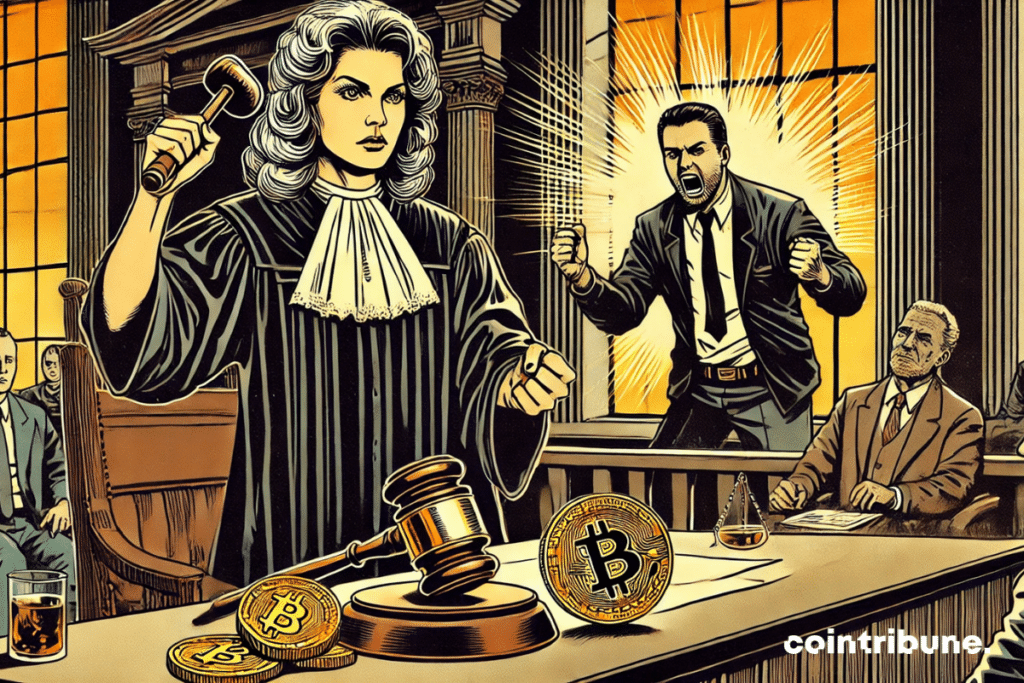Can Bitfinex Recover Its Stolen Crypto ? The Court Will Decide
Legal decisions concerning cryptocurrencies play a key role in the evolution of sector regulation. Indeed, when it comes to stolen funds, the question becomes even more sensitive, as it pits the principle of confiscation against that of restitution to victims. The case of the Bitfinex hack in 2016, one of the largest bitcoin thefts in history, crystallizes these tensions. After the seizure of 94,643 BTC by U.S. authorities, the judiciary questions the appropriateness of returning them to Bitfinex. Such a decision could create a major legal precedent that would influence the future handling of cryptocurrencies seized by the courts.

Uncertainties Surrounding the Restitution of Funds
On January 28, 2025, Judge Colleen Kollar-Kotelly of the Southern District Court of New York demanded that the U.S. government clarify its position on the restitution of seized bitcoins to Bitfinex. In her order, she questions the legitimacy of such a transfer and simultaneously wonders about the legal ownership of the funds and the consequences of a restitution on the confiscation order. She clarifies that such a decision could be contestable, as it “would reduce the amount of the ordered confiscation.”
This case dates back to the Bitfinex hack in 2016, one of the largest cryptocurrency thefts at the time, with 119,754 BTC stolen. After several years of investigation, U.S. authorities arrested Ilya Lichtenstein and his wife Heather Morgan, a.k.a. “Razzlekhan,” in 2022 for laundering funds from this hacking incident. Lichtenstein admitted to being behind the hack, while Morgan, known for her artistic activities and videos on social media, played a key role in hiding the stolen assets. In 2023, the couple pleaded guilty and was sentenced to five years and 18 months in prison. Despite these convictions, the use of the seized bitcoins remains an unresolved issue, fueling a legal debate with major implications for the future of cryptocurrencies seized by the judiciary.
The Legal and Economic Implications of Such a Decision
This case raises a fundamental question: should cryptocurrencies seized by the judiciary be returned to the victims or integrated into state assets? According to a court document from October 2024, Bitfinex could be the only entity authorized to claim these funds, which justifies the request for restitution. However, some previous court decisions have considered that such a process risks contradicting the principles of confiscation. Indeed, a direct restitution could be perceived as a reduction of the legally confiscated amount, which would undermine the punitive and deterrent logic applied to assets resulting from criminal activities.
Another issue concerns the management of the seized bitcoins. In the United States, authorities have often conducted auctions of confiscated cryptocurrencies, thus injecting these funds into the public treasury. A massive liquidation of the 94,643 BTC from the Bitfinex case could influence the market and exacerbate bitcoin price volatility. Conversely, a direct restitution to Bitfinex would involve defining precise redistribution modalities, particularly towards users affected by the 2016 hack. This option raises technical and legal challenges, especially regarding fund traceability and their distribution among the initial victims.
The U.S. government must provide its answer by February 4, 2025, a decision that could set a major legal precedent. If the restitution is approved, it would enhance investor and user confidence in exchanges’ ability to recover stolen funds in the event of hacking. Conversely, a refusal could establish a stricter legal framework, reducing recovery prospects for platforms victimized by cyberattacks. In a context where cryptocurrencies continue to establish themselves in the global economy, this case could redefine how these seized assets are treated by the courts.
This case highlights the lack of clear regulatory frameworks regarding the management of cryptocurrencies seized by the judiciary. Today, legal uncertainty fuels divergent interpretations regarding the legitimate ownership of confiscated bitcoins and their restitution to victims. Furthermore, with the rise of cryptocurrencies in the global economy, courts will need to strike a balance between applying traditional confiscation rules and considering the specificities of a decentralized ecosystem. The awaited decision on the Bitfinex case could thus redefine how jurisdictions handle seized assets, influencing future cases related to crypto crime.
Maximize your Cointribune experience with our "Read to Earn" program! For every article you read, earn points and access exclusive rewards. Sign up now and start earning benefits.
Diplômé de Sciences Po Toulouse et titulaire d'une certification consultant blockchain délivrée par Alyra, j'ai rejoint l'aventure Cointribune en 2019. Convaincu du potentiel de la blockchain pour transformer de nombreux secteurs de l'économie, j'ai pris l'engagement de sensibiliser et d'informer le grand public sur cet écosystème en constante évolution. Mon objectif est de permettre à chacun de mieux comprendre la blockchain et de saisir les opportunités qu'elle offre. Je m'efforce chaque jour de fournir une analyse objective de l'actualité, de décrypter les tendances du marché, de relayer les dernières innovations technologiques et de mettre en perspective les enjeux économiques et sociétaux de cette révolution en marche.
The views, thoughts, and opinions expressed in this article belong solely to the author, and should not be taken as investment advice. Do your own research before taking any investment decisions.